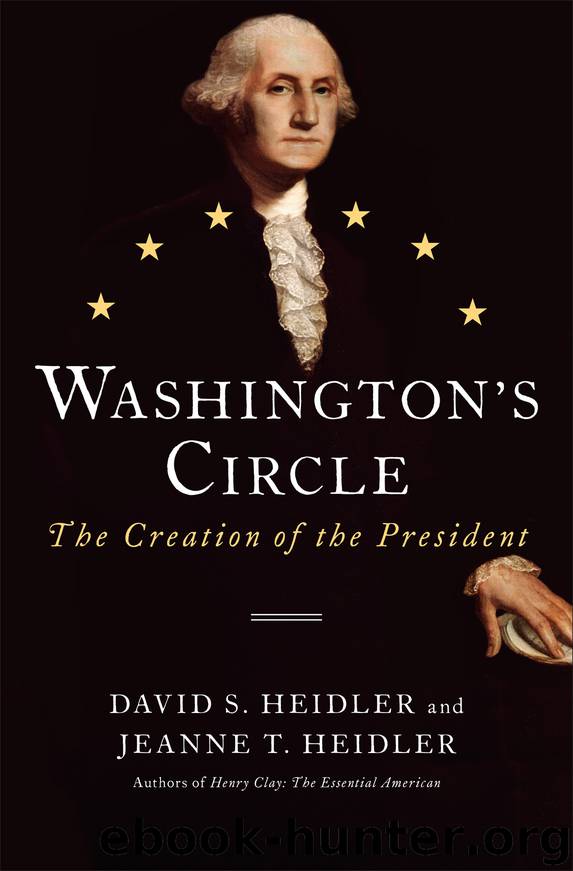Washington's Circle by David S. Heidler Jeanne T. Heidler

Author:David S. Heidler,Jeanne T. Heidler [Heidler, David S.]
Language: eng
Format: epub
ISBN: 978-0-679-60383-2
Publisher: Penguin Random House LLC
Published: 2015-03-16T16:00:00+00:00
Newspaper and pamphlet attacks had stepped up over the summer of 1792. Because Hamilton and Jefferson believed the other responsible for starting the public phase of the conflict, each thought the other should stop the assaults first. Hamilton and his supporters saw Philip Freneau’s establishment of the National Gazette in the fall of 1791 as a declaration of war, but Freneau’s columns initially were light on political commentary and heavy on literature and other cultural topics. In November 1791, however, Madison began anonymous contributions that would eventually span across eighteen essays of the Gazette. Madison’s pen was subtle. He first laid the groundwork and then more pointedly condemned moneyed interests, cronies that Madison charged Hamilton with trying to empower. He explained why state governments were necessary to check national power, why public opinion and a free press were important guardians of liberty, and how political parties were inevitable in a republic. This last was a significant departure for Madison, because it broke with the American tradition of eschewing political parties as inherently corrupt. Madison now distinguished parties from factions, which he had discussed in Federalist, no. 10.21
In the spring of 1792, Madison’s essays became increasingly partisan. Others joined in to fill the National Gazette with criticisms of Hamilton’s system for causing the recent financial panic. In his March 31, 1792, essay “The Union: Who Are Its Real Friends?” Madison used the crash to attack Hamilton’s schemes as leading to speculation, debt, and unconstitutional laws. Madison sprinkled the specter of monarchy and aristocracy throughout. The real friends of the Union wanted power invested in the people. They loved liberty and limited government while opposing hereditary privilege and public debt.22 More and more Madison used the capitalized word “Republican” to describe those who agreed with him, and thus played the same rhetorical trick on the Federalists that they had pulled during ratification. Madison could paint those who disagreed with him as “Antirepublicans.” A measure of this tactic’s effectiveness was evidenced when Freneau also began using the term “Republican” to describe those who supported their views.23
Hamilton fought back with newspaper essays of his own. Fixating on Jefferson as the real author of Madison’s attacks, Hamilton’s anonymous essays in John Fenno’s Gazette of the United States accused the secretary of state of hiring Philip Freneau “to vilify those to whom the voice of the people has committed the administration of our public affairs.” A variety of pseudonyms conveyed the same message: Jefferson had never supported the Constitution, Jefferson had placed a man on the government payroll to undermine the government, and Jefferson had always opposed paying the country’s debts.24
Freneau insisted that Jefferson had nothing to do with establishing his newspaper. The editor played the controversy as high drama by swearing an oath before the mayor of Philadelphia to that effect and publishing it in his National Gazette as well as Fenno’s Gazette of the United States. He contrasted Fenno’s generous printing contracts from the Treasury Department to his measly $250 salary in terms of real as opposed to purported patronage.
Download
This site does not store any files on its server. We only index and link to content provided by other sites. Please contact the content providers to delete copyright contents if any and email us, we'll remove relevant links or contents immediately.
| African Americans | Civil War |
| Colonial Period | Immigrants |
| Revolution & Founding | State & Local |
Cat's cradle by Kurt Vonnegut(13868)
Pimp by Iceberg Slim(12931)
Underground: A Human History of the Worlds Beneath Our Feet by Will Hunt(11257)
4 3 2 1: A Novel by Paul Auster(11049)
The Radium Girls by Kate Moore(10907)
American History Stories, Volume III (Yesterday's Classics) by Pratt Mara L(4825)
Perfect Rhythm by Jae(4621)
Wiseguy by Nicholas Pileggi(4586)
The Fire Next Time by James Baldwin(4343)
Paper Towns by Green John(4169)
A Higher Loyalty: Truth, Lies, and Leadership by James Comey(4033)
Pale Blue Dot by Carl Sagan(4001)
The Mayflower and the Pilgrims' New World by Nathaniel Philbrick(3914)
The Doomsday Machine by Daniel Ellsberg(3731)
Too Much and Not the Mood by Durga Chew-Bose(3694)
Killers of the Flower Moon: The Osage Murders and the Birth of the FBI by David Grann(3609)
The Borden Murders by Sarah Miller(3590)
The Sympathizer by Viet Thanh Nguyen(3481)
Killing England by Bill O'Reilly(3455)
